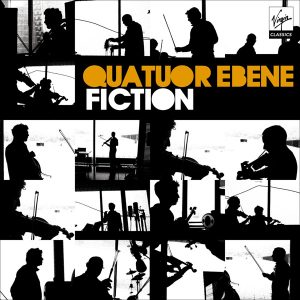By Chelsea Thornton (Staff Writer) – Email
 This time of semester, I always find that my choice of music begins to change. As finals loom closer, my regular playlists are replaced by an increasingly classically dominated list, in hopes that all that research indicating Beethoven and Mozart magically make you smarter holds some weight, or at least enough heft to get me through April. The Ebene Quartet, or Quatuor Ébene as it is known in its native France, features violinists Pierre Colombet and Gabriel le Magadure, violist Mathieu Herzog, and cellist Raphael Merlin. With the label Virgin Classics, partner label to EMI Classics, which produces Paul McCartney’s classical compositions, the Ebene Quartet made a name for themselves with interpretations of classical music by Debussy, Ravel, and Fauré.
This time of semester, I always find that my choice of music begins to change. As finals loom closer, my regular playlists are replaced by an increasingly classically dominated list, in hopes that all that research indicating Beethoven and Mozart magically make you smarter holds some weight, or at least enough heft to get me through April. The Ebene Quartet, or Quatuor Ébene as it is known in its native France, features violinists Pierre Colombet and Gabriel le Magadure, violist Mathieu Herzog, and cellist Raphael Merlin. With the label Virgin Classics, partner label to EMI Classics, which produces Paul McCartney’s classical compositions, the Ebene Quartet made a name for themselves with interpretations of classical music by Debussy, Ravel, and Fauré.
Their new album, Fiction, marks a definite departure from their inaugural effort. The quartet has revealed that they are in fact closet jazz players, and filled the album with sixteen jazz dominated pieces. In the album’s liner notes the quartet explains that they named it Fictios because it embodies a “pseudo-reality of a string quartet that plays and improvises in order to regain the freedom that all classical musicians had in the past.” The album definitely has a storybook feel to it, combining a myriad of iconic music moments into one kaleidoscope of an album. Here you can find covers of “Someday My Prince Will Come” from the soundtrack of Disney’s Snow White, Nat King Cole/Charlie Chaplin’s “Smile,” Bruce Springsteen’s “Streets of Philadelphia,” “Over the Rainbow” from The Wizard Oz, and “Come Together” by The Beatles.
The most surprising song on the album is definitely the successful cover of “Come Together.” The weird, rattling, psychedelic strangeness of the original song’s opening is reproduced by the quartet by bouncing their bows off their strings, and they somehow manage to make violins, a viola, and a cello sound a little bit rock and roll. There is even a real solo that captures all the scorching intensity of an electric guitar. A video of a live performance of the song revealed that at times the violinists hold their violins like guitars and pick the strings.
One of the surprisingly endearing features of this album is the presence of soft French accents in the many vocal portions. The quartet’s violist sings “Streets of Philadelphia” with a barely there accent that shows most strongly in his pronunciation of the titular city, while Fanny Ardent echoes Edith Piaf in “Lilac Wine.”
“Footprints” is where the quartet strikes the finest balance between their current album’s jazz-driven sound and the classical genre where they achieved their first success. The song, while jazz-y overall maintains some of the sweeping power of classical music through its use of rising crescendos and smooth, flowing falls through the scales.
Overall, the album feels like a band geek’s musical rebellion: he might not be playing Mozart anymore, but he won’t be asked to play the school dance either.


